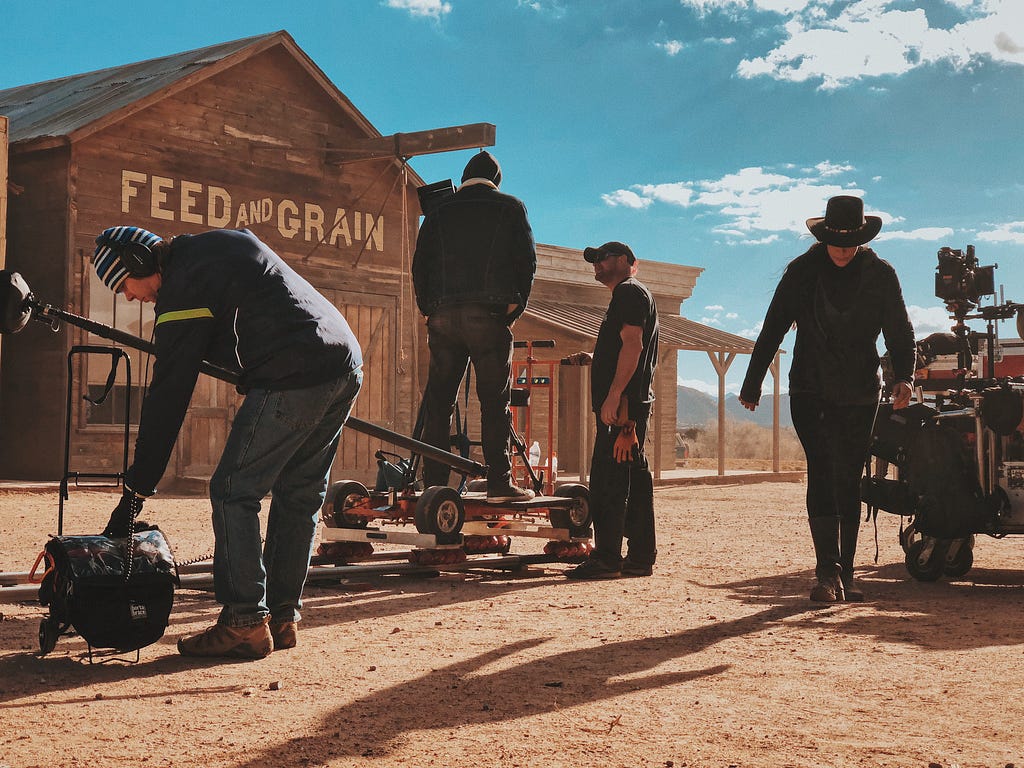
Hollywood is hungry
See if you can guess one thing that the following popular streaming shows have in common:
The Expanse, Jack Ryan, His Dark Materials, Lovecraft Country, Longmire, The Queen’s Gambit, Pretty Little Liars, Shadow and Bone, Killing Eve, A Series of Unfortunate Events, Dash and Lily, Looking for Alaska, The Handmaid’s Tale, The Witcher, Outlander, Big Little Lies, The Haunting of Hill House, Foundation, and Game of Thrones.
If you guessed that all of them (along with many others) are based on books, give yourself a gold star.
With the rise of streaming services, studios are looking for new content like never before. This is great news for writers, and not just screenwriters. If you write fiction, here’s how you can take advantage of this streaming story boom.

Although it chills my prose-loving soul to say it, Hollywood views books a little differently than most fiction writers do. Rather than looking for lyrical novels full of artful sentences, what they’re often interested in are “attractive properties.”
An attractive property can include many things, but it usually involves memorable characters, engaging arcs, unique story worlds, and concepts that are compelling and relevant. For much of Hollywood, a book is essentially a proof of concept that certain distinct characters, arcs, worlds, and situations might work together effectively to attract an enthusiastic audience.
Keep in mind, a producer usually isn’t only thinking of adapting a story for one platform. When they’re considering “properties” to option, they’re thinking of what unique characters and concepts can be marketed across multiple realms such as film, TV, streaming, and online, as well as potential spin-offs, computer games, apps, toys, pajamas, and a plethora of other merchandise and licensing agreements (think Marvel Universe).

But beyond making a profit, what many creators in Hollywood want, and what we all need, are diverse, complex characters and relevant stories that can help us gain insights into the pressing issues we face.
This is where books excel. It’s a lot less expensive to explore daring new stories, worlds, concepts, and characters through a novel, rather than a movie or TV show. Hence, novelists are often at the forefront of discovering the narratives we desperately need. And the imaginative work that novelists do to create characters, worlds, and concepts in books are what give many of the most successful streaming shows a cohesive, complex foundation to build upon.
How I Got a Film Producer Interested in My Book
My most recent novel, The Namer of Spirits, is a steampunk eco-fantasy adventure for ages 9 and up. It just came out this fall, and it was optioned for film/TV development over a year before it got published. (If you want to read about the deal, here’s a Deadline article on it.)
Although everyone’s path to an option agreement will be different, here are three critical steps to increase your odds:
1: Write a distinct book and revise it until every word serves the story
Don’t send something out to editors and producers before it’s ready. Make sure your characters, concepts, and story world are fully realized and present on the page.
2: Practice pitching it
Usually, it’s best to be able to describe the book in a sentence or two. The elevator pitch should also suggest what’s unique about the story, what audience it’s for, and why it’s a story that needs to be told now.
Practice this pitch with friends (and strangers) any chance you get. One way to do this is to turn it into a game. Every time someone asks about your work, take it as an opportunity to practice and refine your pitch. Then ask them for feedback on what interested them, or didn’t, in the pitch.

I often struggle with pitching my stories because I know so much about them that it’s hard to keep the pitch simple. But I also know that saying, “Um… it’s a really hard story to explain” is a sure way to flub a pitch.
To refine the pitch, keep in mind that the primary purpose of the pitch is to get someone interested in learning more. You don’t have to convey everything about a story — just what makes it unique, engaging, and essential.
The bottom line is that if you can’t convey what’s interesting about your story in a clear, succinct way, it will be hard to get others interested in it.
3: Use your network
The publishing world is surprisingly small. So is the studio world. You might be surprised by how many writers, directors, producers, and agents know each other. To break into this world, it helps to develop relationships with a few people in the industry first.
Maybe you don’t know anyone in Hollywood. I didn’t, and my agent (who’s primarily focused on working with editors and book publishers) didn’t have many Hollywood connections either. But when I asked around, I discovered a producer who’d graduated from the same high school that I did. And when I looked that producer up on social media, I learned that we shared several interests.
Here’s a key thing remember: producers, agents, directors, and writers constantly have people asking them to look at their script or manuscript, which can become annoying. Instead of asking them for something, focus on building authentic relationships with fellow creators who you share common interests with and want to work with.

BTW: If you don’t have any connections (or even friend-of-a-friend connections) with people in the film industry, don’t despair. There are many ways to create such connections. One new and surprisingly accessible avenue is Sidetime.com. Full disclosure: Robert, the producer I mentioned earlier, started Sidetime with the hope of opening doors for more diverse creators (that’s how I learned about it).
Sidetime provides people who are passionate about breaking into industries like film, music, and publishing a way to have a quick one-on-one conversation with prominent writers, directors, producers, cinematographers, and other professionals so that they can develop insider knowledge, break down barriers, and create connections. But connections alone are rarely enough to land an option agreement. Which brings us to the next point.
Always Have Another Pitch
After talking with Robert and learning a bit more about what he was interested in, I ended up sending him a copy of one of my newest novels. Although he wasn’t interested in optioning that novel, he did ask me what else I was working on.
“What else are you working on?” is the golden question. It’s an opportunity you never want to miss by only having one pitch ready. Even if a story isn’t done yet, it’s a good idea to practice pitching it so that you have a second (or third) pitch ready.
In my case, when Robert asked what else I was working on, I told him about the draft I’d just finished of The Namer of Spirits (at the time I was calling it The Naming Girl). Robert liked the characters and story concepts, and he knew a director who was interested in some of the core issues the book explored. He read a copy of the manuscript, and sent it on to Jennifer Phang, a director who’s directed episodes of Foundation, The Expanse, Marvel’s Cloak & Dagger, Agents of S.H.I.E.L.D., Resident Alien, The Boys, and the brilliant sci-fi film Advantageous (to name just a few of her projects).

Jennifer liked the story and worked with Robert and my agency to develop an option agreement. But having a book optioned isn’t the end of the journey. Now it’s a matter of getting a big studio, or other financial backers, interested in the project so it can be produced. (If you know anyone who might want to develop a “brilliantly original” steampunk eco-fantasy movie or series, please tell them about The Namer of Spirits.)
Be Bold, We Need Your Stories
One of the most important things about getting a book optioned for film/TV development is being brave enough to explore new narrative territory. As Milan Kundera put it, “Novelists draw up the maps of existence by discovering this or that human possibility.”
Stories shape the ways we think and act. To solve many of the problems we currently face, we need stories that not only help us become more aware, they help us envision new possibilities and solutions. And to find such possibilities, it’s crucial to keep creating and keep sharing your work, because you never know what might interest someone and become a hit.
Here’s to novelists drawing up “the maps of existence” and discovering the human possibilities we need. Happy creating!
Todd Mitchell’s newest book for writers, artists, and creators who want to enhance their creative practice is Breakthrough: How to Overcome Doubt, Fear, and Resistance to Be Your Ultimate Creative Self (published November 2021 by Owl Hollow Press).
How I Sold a TV/Movie Option on My Book Before It Was Published was originally published in The Writing Cooperative on Medium, where people are continuing the conversation by highlighting and responding to this story.
Read more: writingcooperative.com

 Photo by
Photo by 